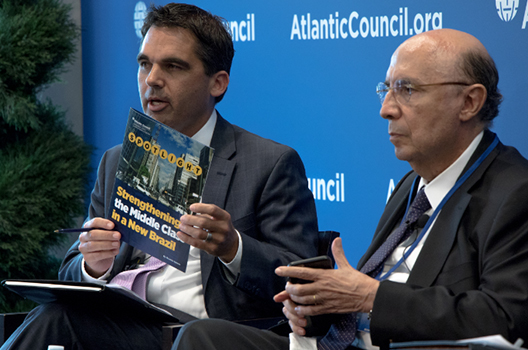 After the biggest recession Brazil has ever known, leading economic indicators are beginning to show the light at the end of the tunnel. As Brazil tries to find the exit sign, the country continues to face challenges in the political arena, amid growing corruption scandals. Nevertheless, recovery is on its way, and Brazil’s middle class must be protected.
After the biggest recession Brazil has ever known, leading economic indicators are beginning to show the light at the end of the tunnel. As Brazil tries to find the exit sign, the country continues to face challenges in the political arena, amid growing corruption scandals. Nevertheless, recovery is on its way, and Brazil’s middle class must be protected.
To provide answers on how to create a leaner and more efficient state without jeopardizing the gains of the middle class, the Atlantic Council’s Adrienne Arsht Latin America Center hosted a discussion with Brazil’s Finance Minister Henrique Meirelles. The discussion also marked the launch of the center’s latest Spotlight: Strengthening the Middle Class in a New Brazil. Following introductory remarks by Senior Vice President for Strategic Initiatives and Director of the Adrienne Arsht Latin America Center Peter Schechter, Minister Meirelles remarked on the current situation in Brazil and the reforms helping to guide the country out of the recession.
Minister Meirelles expects a brighter next couple years. Growth is back (2.7 percent potential growth in 2018), inflation is still trending down (4.4 percent in March), and impending structural changes are a sign that Brazil is moving ahead, the minister affirmed. Some of the reforms the government is proposing to put Brazil back on track include social security reforms, fiscal reforms (caps on public spending, facilitating tax compliance), improvements to quality of education, and new anti-corruption laws. These changes could improve productivity rates, as well as infrastructure investments, through market-based roots. Global risks exist, like increasing protectionism, but Brazil’s current trade account is diversified enough to withstand a shift in the wind, Meirelles suggested.
As the engine of the Southern Cone, Brazil has the potential to steer the region in a new direction of global engagement and innovation. While scandals are in the headlines, Minister Meirelles advised the audience “not to be spooked by the noise,” because Brazil is moving forward and the middle class will prosper for it.
Following the minister’s opening statements, Jason Marczak, director of the Latin America Economic Growth Initiative at the Adrienne Arsht Latin America Center, joined him on stage, along with Dan Bryant, senior vice president of global public policy and government affairs at Walmart; and Ricardo Sennes, partner at Prospectiva Consultancy and nonresident senior Brazil fellow at the Adrienne Arsht Latin America Center. The three asked Minister Meirelles further questions on how Brazil’s reforms will serve the middle class.
As Brazil looks to reconfigure its labor market, Dan Bryant wondered if the ongoing reforms will bring the informal market into the formal economy. In response, the minister echoed solutions provided in the Spotlight, including relaxing regulations on employment — like limits to part-time work, — regulating overpay, and legally recognizing agreements between unions and companies. While the new outsourcing law, if not applied well, could marginalize workers by reducing formal positions and benefits, the minister assured labor reform could decrease unemployment and facilitate the transition. Furthermore, the government’s acceleration of the labor reform and social security vote signals the urgency to move forward in Brazil’s transformation, he said.
Ricardo Sennes then commented on the investment environment, which he called “the weak part of Brazil’s model.” Investment drives innovation and keeps an economy from stalling, and “the middle class must also be treated as an investor,” Sennes commented. Minister Meirelles assured, however, that the reforms underway and the positive leading indicators will “facilitate investment and move Brazil toward a new equilibrium.”
The country’s future is tied to global economic engagement. Its transformation must preserve recent social gains. More precisely, it must protect and uplift the middle class, which is at the center of Brazil’s evolution.
